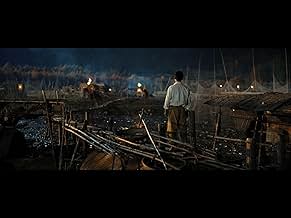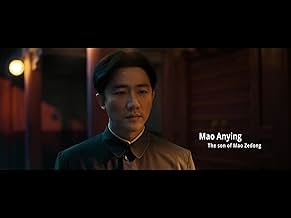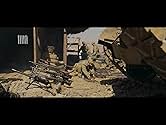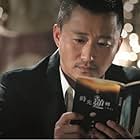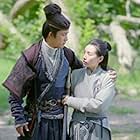IMDb RATING
5.5/10
4.6K
YOUR RATING
In the fierce battlefield in the midst of the harsh weather conditions, Wu Qian Li and Wu Wan Li, two brothers soldier including the brave Chinese soldiers must fight together and find a way... Read allIn the fierce battlefield in the midst of the harsh weather conditions, Wu Qian Li and Wu Wan Li, two brothers soldier including the brave Chinese soldiers must fight together and find a way to cope with the invasion of US forces.In the fierce battlefield in the midst of the harsh weather conditions, Wu Qian Li and Wu Wan Li, two brothers soldier including the brave Chinese soldiers must fight together and find a way to cope with the invasion of US forces.
- Awards
- 33 wins & 38 nominations total
Featured reviews
It's 1950. American forces have landed at Incheon and driving north towards the Chinese border. The politically ambitious warmongering American military leader Douglas MacArthur insists on bombing Chinese border locations to cut off supplies and retreat for the North Koreans. Chinese leader Mao decides to answer the provocation and sends in the PLA. They would confront the Americans at Lake Changjin. The Americans would call it, the Battle of the Chosin Reservoir.
I'm not going to argue for accuracy. There is a definite deliberate slant to its views but it's not overtly wrong. A perfect example happens quite early. Somebody gets CGI happy and puts in a sky full of American fighter planes. There is more chance of them flying into each other than bombing the right targets. It's insane how many planes are in the sky on their bombing run. It's like a WWII mass bombing raid except it's utter chaos. Something similar happens to the American characters with one exception. There is one heroic competent war leader. Otherwise, the Americans are mostly arrogant, fat, and throwing up his breakfast. It's a political slant to sell to the Chinese public. I would compare this to Pearl Harbor without the romance. It's not a good thing. The CGI is a micro-step down from that. The story is over-the-top melodrama. The film is using a lot of slow-motion action. The best war scene happens quite early with the soldiers faking dead on the dry river bed. If it stayed semi-realistic, this could have been good.
I'm not going to argue for accuracy. There is a definite deliberate slant to its views but it's not overtly wrong. A perfect example happens quite early. Somebody gets CGI happy and puts in a sky full of American fighter planes. There is more chance of them flying into each other than bombing the right targets. It's insane how many planes are in the sky on their bombing run. It's like a WWII mass bombing raid except it's utter chaos. Something similar happens to the American characters with one exception. There is one heroic competent war leader. Otherwise, the Americans are mostly arrogant, fat, and throwing up his breakfast. It's a political slant to sell to the Chinese public. I would compare this to Pearl Harbor without the romance. It's not a good thing. The CGI is a micro-step down from that. The story is over-the-top melodrama. The film is using a lot of slow-motion action. The best war scene happens quite early with the soldiers faking dead on the dry river bed. If it stayed semi-realistic, this could have been good.
As a Chinese, I don't like this movie at all. This movie is kind of typical of Hollywood.
It's not a good movie to tell the history of the battle of Lake Changjin or the history of the war to resist U. S. aggression in Korea.
The movie didn't tell clearly that before Chinese army attended the war, the U. S. Navy's seventh Fleet had sailed into the Taiwan Strait on the orders of President Harry Truman. At that time, both Chinese government and Chinese people didn't want to attend a war again. But we have no choice.
The movie seems to blame MacArthur for all these faults. But at that time, the U. S. government itself also supported attacking NORTH Korea and even China. China warned the US not to cross the 38th parallel, but the government's leader Truman ignored it and thought China wouldn't send troops. These weren't made clear in the movie.
How the Chinese generals direct their soldiers to fight were not shown clearly in the movie. How the Chinese solders used wisdom and courage to defensed the tanks were not shown clearly in the movie either. They even let the main character use another tank to defense. That cannot be true.
Even at the end, the director arranged for American officers to salute the dead Bodies of Chinese soldiers. I'm not sure wether an ordinary soldier would do it, but I'm quite sure those who led the armies to attack Chinese People's Volunteers would not. It's really ridiculous.
The story about Lei was really great. He knew how to lead the soldiers to defense with wisdom, he knew to take advantage of the terrain, he also knew a soldier's sacrifice needs to be worth it. I cried when he died, especially when I heard the song of Yimeng. The Chinese sacrificed a lot in the war of liberation but now they need to fight again, to fight against the US army.
Who started the war first? Who amplified the war first? Who is invading? OF COURSE, not China.
Some people may think, the film is a propaganda tool for the Chinese government. This is ridiculous. This movie didn't even tell the history of the battle of Lake Changjin in a good way. Can it be propaganda? It wasn't nearly as much propaganda as Transformers, which showed off the U. S. military.
Do not assume every Chinese film as a propaganda tool, to be honest, the Chinese directors weren't good at propagating politics as American directors.
It's not a good movie to tell the history of the battle of Lake Changjin or the history of the war to resist U. S. aggression in Korea.
The movie didn't tell clearly that before Chinese army attended the war, the U. S. Navy's seventh Fleet had sailed into the Taiwan Strait on the orders of President Harry Truman. At that time, both Chinese government and Chinese people didn't want to attend a war again. But we have no choice.
The movie seems to blame MacArthur for all these faults. But at that time, the U. S. government itself also supported attacking NORTH Korea and even China. China warned the US not to cross the 38th parallel, but the government's leader Truman ignored it and thought China wouldn't send troops. These weren't made clear in the movie.
How the Chinese generals direct their soldiers to fight were not shown clearly in the movie. How the Chinese solders used wisdom and courage to defensed the tanks were not shown clearly in the movie either. They even let the main character use another tank to defense. That cannot be true.
Even at the end, the director arranged for American officers to salute the dead Bodies of Chinese soldiers. I'm not sure wether an ordinary soldier would do it, but I'm quite sure those who led the armies to attack Chinese People's Volunteers would not. It's really ridiculous.
The story about Lei was really great. He knew how to lead the soldiers to defense with wisdom, he knew to take advantage of the terrain, he also knew a soldier's sacrifice needs to be worth it. I cried when he died, especially when I heard the song of Yimeng. The Chinese sacrificed a lot in the war of liberation but now they need to fight again, to fight against the US army.
Who started the war first? Who amplified the war first? Who is invading? OF COURSE, not China.
Some people may think, the film is a propaganda tool for the Chinese government. This is ridiculous. This movie didn't even tell the history of the battle of Lake Changjin in a good way. Can it be propaganda? It wasn't nearly as much propaganda as Transformers, which showed off the U. S. military.
Do not assume every Chinese film as a propaganda tool, to be honest, the Chinese directors weren't good at propagating politics as American directors.
There are too many distinct inferior positions for chinese to respond the war,but if they make a concession,the war would have to be undertaken by their children.
For a war movie, it is not bad, at least have some plots. The sad truth is that there is no winner in this war, that's why it's dragged for three years and no one can claim to be the winner. But since it's a movie, not a documentary, I don't think we need to discuss the truth or fiction here. However, many reviews are anti-China, I highly doubt those people ever watched the actual movie.
Commissioned by the Chinese Communist Party to commemorate their 100th anniversary, The Battle at Lake Changjin pours an entire nation's jingoistic fervour, anti-US sentiments, blatant propaganda & more into a 3-hour long war film that's no different from majority of Hollywood war films in its fact distortion & history revision but it's a tad too simplistic & predictable to deliver on the storytelling front.
Directed by Chen Kaige, Tsui Hark & Dante Lam, the story is a fictionalised retelling of the battle that unfolded between Chinese soldiers & American troops during the Korean War and is crafted in a manner that's meant to provoke nationalistic pride in its intended audience. While the first hour is uneventful, things do get better once the battle is on and the film does well to make sure the interest isn't entirely lost from thereon.
The mass battle sequences do deliver the goods but only when it's being waged in close-proximity. Still, for a $200 million production, the CGI is an absolute cringe and prevents several scenes from making their desired impact. Further weakening the ride is the narrative approach, awful dialogues, cardboard characters, excessive runtime, repetitive action, weak performances & overdone sentimentality. It is a state-sponsored picture and it shows.
Overall, The Battle at Lake Changjin has moments of spectacle and the swift pans & camera manoeuvres add the necessary cinematic touches to its action sequences but there is a lot in here that could've been further improved. The caricature depiction of US forces isn't really a complaint since most American war films do the same. However, the extreme flag-waving on display is so forceful & overpowering that it often kills the film's unabashedly entertaining aspects.
Directed by Chen Kaige, Tsui Hark & Dante Lam, the story is a fictionalised retelling of the battle that unfolded between Chinese soldiers & American troops during the Korean War and is crafted in a manner that's meant to provoke nationalistic pride in its intended audience. While the first hour is uneventful, things do get better once the battle is on and the film does well to make sure the interest isn't entirely lost from thereon.
The mass battle sequences do deliver the goods but only when it's being waged in close-proximity. Still, for a $200 million production, the CGI is an absolute cringe and prevents several scenes from making their desired impact. Further weakening the ride is the narrative approach, awful dialogues, cardboard characters, excessive runtime, repetitive action, weak performances & overdone sentimentality. It is a state-sponsored picture and it shows.
Overall, The Battle at Lake Changjin has moments of spectacle and the swift pans & camera manoeuvres add the necessary cinematic touches to its action sequences but there is a lot in here that could've been further improved. The caricature depiction of US forces isn't really a complaint since most American war films do the same. However, the extreme flag-waving on display is so forceful & overpowering that it often kills the film's unabashedly entertaining aspects.
Did you know
- TriviaThe most expensive film ever produced in China as of 2021, with a budget of $200 million.
- ConnectionsFeatured in Zomergasten: Garrie van Pinxteren (2024)
- How long is The Battle at Lake Changjin?Powered by Alexa
Details
Box office
- Budget
- $200,000,000 (estimated)
- Gross US & Canada
- $342,411
- Opening weekend US & Canada
- $105,768
- Nov 21, 2021
- Gross worldwide
- $902,548,476
- Runtime2 hours 56 minutes
- Color
- Sound mix
- Aspect ratio
- 2.39 : 1
Contribute to this page
Suggest an edit or add missing content







